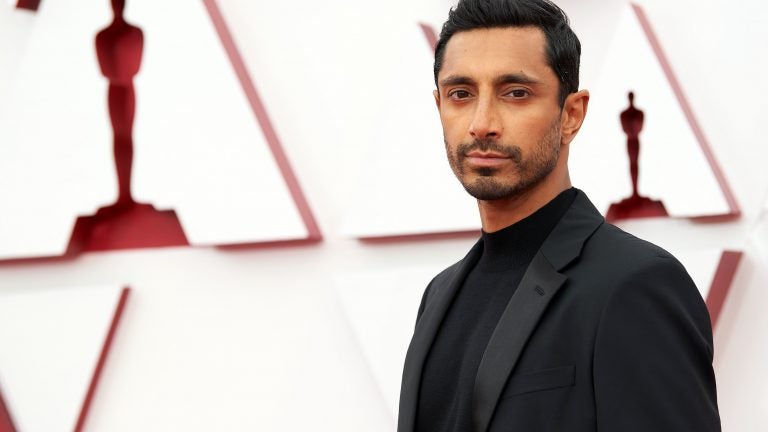Just 10% of popular movies had a Muslim character. Riz Ahmed wants to change that

Riz Ahmed at the 2021 Academy Awards. (Handout/A.M.P.A.S. via Getty Images)
Muslims are very rarely depicted in movies, and when they are, it’s usually as a stereotypical terrorist, what Oscar nominated actor Riz Ahmed calls a “dangerous trope.” Having spoken out about this issue for several years, he’s been looking for hard data. Now’s he got it. This week, The University of Southern California’s Annenberg Inclusion Initiative came out with the report he asked for. It’s titled Missing and Maligned: The Reality of Muslims in Popular Global Movies.
USC’s researchers combed through 200 popular films from the U.S., the U.K., Australia and New Zealand from 2017 to 2019. They found that only six of them had a Muslim in a co-leading role, and only one of those was female. Of the nearly 9,000 speaking parts, fewer than two percent were Muslim. And there none in animated movies.
“Being confronted with the hard stats themselves was in a way shocking to see how bad it was,” Ahmed told NPR. “Just the extent of Muslim erasure, the extent in particular of erasure of Black Muslims, and Muslim women, it was really shocking.”
The report pointed to several examples, including the film Hotel Mumbai, which featured Muslims as terrorists. Movies such as Aladdin depicted Muslim characters only in the past. Other films portrayed Muslims as outsiders or subservient to white characters. In 2017’s Wonder Woman, the character Sameer had to play up a stereotype. He later complains about his limited opportunities. “Not everyone gets to be what they want to be all the time,” he says to the superhero. “Me? I am an actor. I love acting.”
Ahmed and the Inclusion Initiative also worked on the study with The Pillars Fund, a foundation for Muslims in the U.S. The group’s cofounder and president, Kashif Shaikh says that while the Muslim community is racially and ethnically diverse, it’s rarely shown that way in movies. He said Hollywood has created and reinforced dangerous portrayals.
“When you are constantly depicting Muslims as terrorists, there are consequences to that,” says Shaikh. “It’s easy … to now dehumanize us.”
Shaikh says his group is not necessarily calling for only positive portrayals, but he advocates for more Muslim roles with nuance. That includes more LGBTQ roles, or those with disabilities, like Riz Ahmed’s character in the 2019 film Sound of Metal.
In a video announcing the USC study, Ahmed said he was one of only a handful of Muslim actors who get to play Hollywood roles that are “either non-Muslim or unremarkably Muslim.”
“I ask myself if I’m the exception to the rule, what must the rule be about people like me? What must the unwritten rule be about Muslims, a quarter of the world’s population and their place in our stories, our culture and their place in our society, if any?”
Ahmed recalled having been interrogated at an airport after he appeared in the film The Road to Guantanamo.
“I recoiled when that MI5 agent said ‘did you become an actor to further the Muslim struggle?,'” he recalls, saying he’d much rather be acting than be a poster boy for this issue. But he says he realized later he had to speak up.
“Maybe I did become an actor to be seen and portrayed with empathy and dignity, to be seen as fully human as much as any other character.”
The report includes a “blueprint” for Muslim inclusion: solutions for film studios, film schools, and philanthropies. The Pillars Fund is awarding a new fellowship for Muslim artists. Ahmed is also teaming with Mahershala Ali, Ramy Youssef, Sana Amanat, Karim Amer, Rosa Attab, Nida Manzoor and Jehane Noujaim. They’re challenging film companies to secure deals with Muslim creators and to “sunset” the old tropes.
This story was edited for radio by Rose Friedman, and adapted for the web by Rose Friedman and Mandalit del Barco.
9(MDAzMzI1ODY3MDEyMzkzOTE3NjIxNDg3MQ001))




